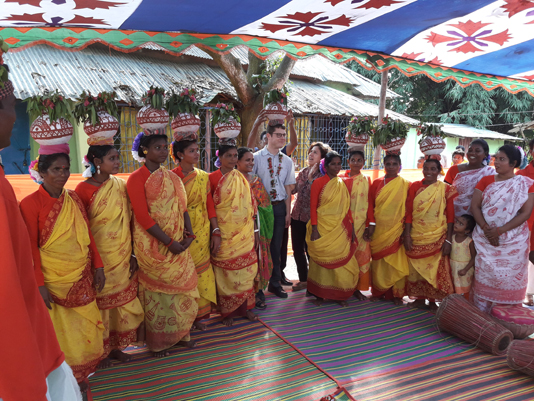RAJSHAHI, Oct 30, 2019 (BSS)- Sonali Marandi, 38, wife of Naren Marandi,
has got access to safe drinking water due to installation of a submersible
pump in their Kushumpur Bongaon village under Tanore Upazila in Rajshahi
district couple of years ago.
“We had no any dependable source to get water before installing the pump.
Then we had to face a lot of problems during the dry season especially from
February to May. But, at present, the pump has become a blessing for us,”
said Sonali, a mother of three children, while talking to BSS on Tuesday.
Twenty-eight ethnic minority households like Sonali Marandi are enjoying
safe drinking water from the pump that has been installed at a cost of Taka
50,037 in 2017 with financial support of Integrated Water Resources
Management (IWRM) project.
Community people and the local Kalma Union Parishad (KUP) contributed ten
percent each of the installation cost.
The nearby Baurigram villagers have also re-excavated a 2.45-kilometer
derelict canal and built a check-dam at a cost of around Taka 55.17 lakh with
the same participatory approach in the same year.
At present, the canal water is being used to irrigate 80 hectares of
cropland and fish culture directly benefiting 280 farming households in many
ways.
A consortium of Swiss Red Cross (SRC) and DASCOH Foundation with financial
support from Swiss Agency for Development and Cooperation-SDC is implementing
the IWRM project in drought affected 39 Union Parishads and three
municipalities under eight Upazilas of Rajshahi, Chapainawabganj and Naogaon
districts since 2014.
The project is intended to improve the well-being of people by means of
promoting coordinated, equitable and sustainable development and management
of water, land and related resources.
An SDC delegation led by its Bangladesh Desk Officer Lukas Luescher visited
the Bongao and Baurigram villages to see for the IWRM project activities and
talked to the beneficiaries on Monday.
SDC Senior Programme Officer Sabina Yasmein Lubna, Tanvir Hassan from SRC
and Akramul Haque and Anwara Begum from DASCOH accompanied the delegation.
The foreign delegates were informed that over 2.80 lakh drought hit-families,
including 80,000 ethnic minorities in 1,280 remote villages, have been
brought under the safe drinking water through commissioning of 390
submersible pumps in the high Barind tract.
KUP Chairman Mainul Islam Swapan told the team that the scheme is working
to supply safe drinking water in those drought-prone areas where acute crisis
of drinking water exists. Its main objective is to supply round-the-year
potable water to all people in the targeted area.
He also apprised them that there is a shortage of drinking water in the
vast Barind tract during the dry season and the problem has become acute for
the last couple of years making the marginalized women especially the ethnic
minorities ones worst vulnerable.
In the wake of inadequate aquifer recharge, groundwater level is declining
alarmingly in the high Barind tract posing a serious threat to the living and
livelihood condition of the marginal population.



